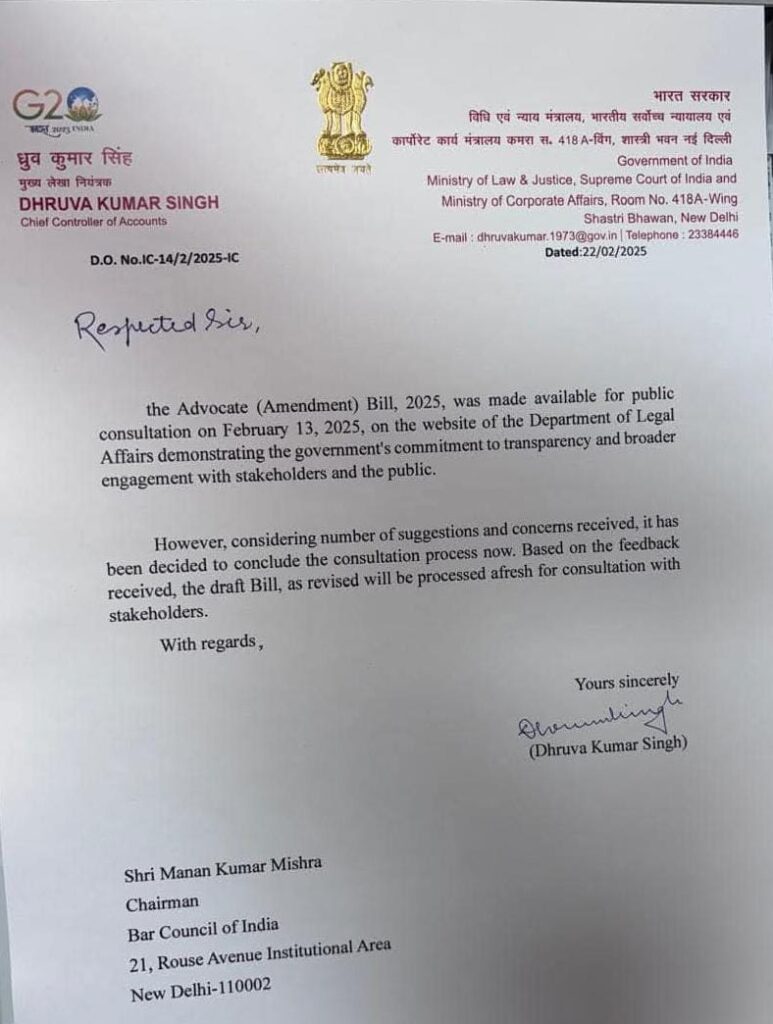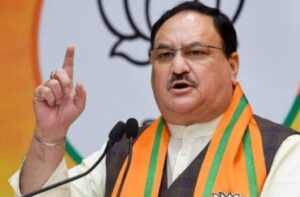Advocates (Amendment) Bill: A Threat to Legacy or a Step Towards Reform???
Samba Times Special

Jammu, 22 February 2025
The Jammu & Kashmir High Court Bar Association (JKHCBA) has announced a protest on 22 February against the Advocates (Amendment) Bill, 2025, citing concerns over its potential impact on the independence of the legal profession. The decision was taken in a meeting chaired by Bar Association President K. Nirmal Kotwal, where it was emphasized that the amendments could
weaken the autonomy of advocates and reduce the powers of legal institutions.
However, in a recent development, the Bar Council of India (BCI) has taken the bill back for revision & reconsideration. Offical communique reads that “considering number of suggestions and concerns received, it has been decided to conclude the consultation process now. Based on the feedback received, the draft Bill, as revised will be processed afresh for consultation with stakeholders. BCI has welcomed the government’s decision to revise and reconsider the Bill following extensive feedback from the legal fraternity.

Government Agrees to Revise the Bill
A press release issued by the Bar Council of India on 22 February 2025 stated that the Ministry of Law & Justice has decided to conclude the consultation process and revise the draft Bill before further discussions. This decision was conveyed in an official letter from Dhruva Kumar Singh, Chief Controller of Accounts, Ministry of Law & Justice, addressed to BCI Chairman Manan Kumar Mishra.
The letter acknowledges the concerns raised by advocates across India and affirms the government’s commitment to a fair, transparent, and inclusive legislative process.
Union Law Minister Arjun Ram Meghwal has assured that all contentious issues will be thoroughly examined before finalizing the Bill and reaffirmed that
“no provision will be enacted that undermines the autonomy, independence, or dignity of the legal profession“
BCI’s Appeal to Advocates and Bar Associations
Given these positive developments, BCI Chairman Manan Kumar Mishra has urged all Bar Associations and legal professionals to refrain from premature protests or strikes. The BCI remains committed to ensuring that amendments to the Advocates Act, 1961, are made only after proper consultation and in the best interest of the legal community.
In his statement, Mishra assured advocates that their rights, privileges, and professional independence remain the BCI’s top priority. He also appealed to all Bar Associations that had announced abstentions to resume court work from Monday, 24 February 2025.
Advocates: The Torchbearers of India’s Democracy
While the government has taken steps to address concerns, the legal fraternity remains vigilant about any move that may compromise the independence of advocates. The legal profession has been a pillar of democracy since India’s freedom struggle.
Legacy: Role of Advocates in the Freedom Struggle
At the time
when the majority of Indians were uneducated and colonial rule suppressed the voices of millions
it was lawyers who became the torchbearers of India’s fight for independence. The greatest names in India’s freedom movement—Mahatma Gandhi, Jawaharlal Nehru, Sardar Patel, Dr. B.R. Ambedkar, C. Rajagopalachari, Subhas Chandra Bose, and many others—were all lawyers.
- Mahatma Gandhi, who transformed the principles of justice into mass movements like Satyagraha and Civil Disobedience.
- Dr. B.R. Ambedkar, the chief architect of the Indian Constitution, who ensured that fundamental rights were enshrined to protect citizens from state excesses.
- Sardar Vallabhbhai Patel, who played a key role in unifying India after independence.
- Jawaharlal Nehru, Subhas Chandra Bose, and several others, who used their legal knowledge to challenge colonial policies.
Many advocates sacrificed their careers to fight against British rule, proving that
the legal profession is not just about representing clients but also about defending the nation’s democratic values.
Advocates and the Making of the Constitution
After independence, it was the legal fraternity that laid the foundation of modern India by drafting the Indian Constitution—
one of the most comprehensive legal frameworks in the world. Dr. B.R. Ambedkar, as the Chairman of the Drafting Committee, ensured that fundamental rights were enshrined in the Constitution to protect every citizen from government excesses.Other lawyers in the Constituent Assembly, like Alladi Krishnaswamy Iyer, K.M. Munshi, and B.N. Rau, played a crucial role in giving India a strong legal foundation. Their vision ensured that India remained a democratic republic with an independent judiciary and a vibrant legal system.
Why Advocates Continue to be the Guardians of Justice
Even today, whenever unjust laws or policies are introduced, it is the legal fraternity that stands up to protect democracy. Whether it is fighting for human rights, press freedom, or judicial independence, lawyers continue to be the last line of defense against authoritarianism.
Why the Advocates (Amendment) Bill is a Concern
Even today, advocates continue to be the beacon of justice for millions of Indians, standing as the last line of defense whenever injustice is done by the Legislature, Executive, or even Judiciary. The proposed Advocates (Amendment) Bill does not erase their past contributions but raises serious concerns about their ability to remain independent in the future.
Key proposals in the bill include:
Expanded Definition of Legal Practitioners: The bill broadens the term “legal practitioner” to encompass corporate lawyers, in-house counsels, and individuals engaged in legal work within private and public organizations, statutory bodies, and foreign law firms.
Mandatory Bar Association Registration: Advocates practicing before courts, tribunals, or authorities are required to register with the Bar Association where they primarily practice. Any changes in location or practice area must be reported to the previous Bar Association within 30 days. Voting rights are limited to one Bar Association per advocate.
Prohibition of Strikes and Boycotts: The introduction of Section 35A prohibits advocates and Bar Associations from initiating or participating in strikes or boycotts that disrupt court proceedings. Violations are considered professional misconduct, subject to disciplinary action. Symbolic or one-day protests are permitted if they do not interfere with court operations.
Government Oversight: The bill allows the Central Government to nominate up to three members to the Bar Council of India (BCI) and grants it authority to issue directives to the BCI for implementing the Act’s provisions.
Liability for Misconduct: Section 45B introduces provisions where clients can file complaints against advocates if deliberate actions or negligence result in financial loss.
These amendments though aim to align India’s legal profession with global standards, enhance transparency, and introduce stricter regulatory mechanisms & Stakeholders and the public are encouraged to review the proposed legislation and provide feedback by the February 28, 2025 deadline, the bill was considered as alarming by the Legal Fraternity especially the clause of prohibition of strikes & bycotts & ors
The prohibition of strikes and boycotts, increased government oversight of the Bar Council of India, and strict disciplinary measures against advocates could curtail their freedom to protest against unconstitutional laws.
The legal fraternity fears that such amendments could pave the way for political interference in the judiciary and weaken the advocates’ ability to challenge government policies.
Conclusion: A Hopeful Resolution
The J&K High Court Bar Association’s protest reflects the legal community’s concerns, but the government’s decision to revise the Advocates (Amendment) Bill, 2025, and engage in further consultations is a positive step.
As the Bar Council of India has emphasized, no amendment should undermine the legal profession’s independence, and the legal fraternity remains watchful to ensure that any future changes align with the core values of justice and democracy.
With the government showing willingness to accommodate concerns, the focus now shifts to constructive dialogue rather than confrontation. The legal community, as it has always done, will continue to safeguard the Constitution and protect the rights of millions of citizens.
Rahul Sambyal ✍️
Executive Editor
Samba Times





